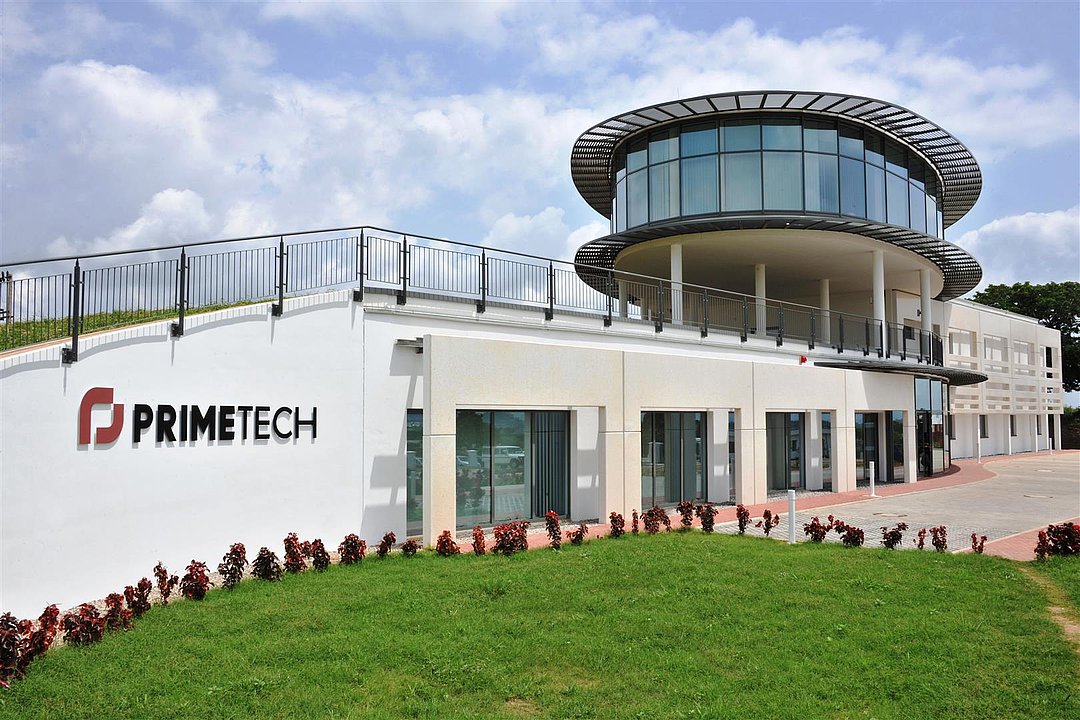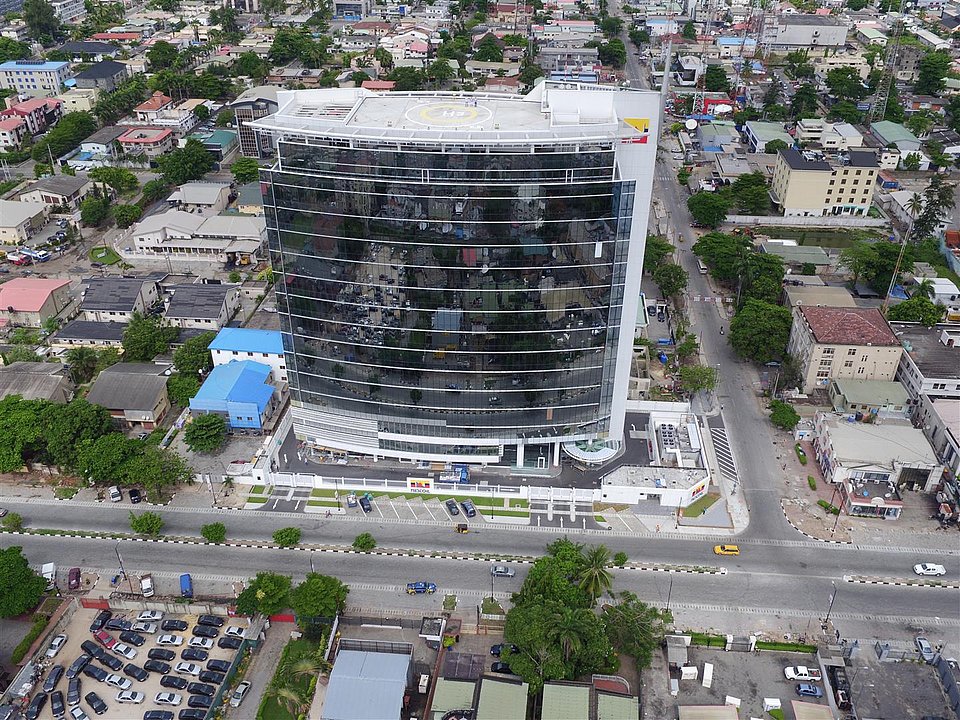
News & Happenings
Going Green: Nigeria’s Building Industry
Sustainability is today’s standard. Across industry and regions, it improves the quality of our lives, protects our ecosystem and preserves natural resources for future generations.
In building construction, sustainability is a central component to the design and construction of modern buildings. In line with the sustainability aspirations of most modern organizations, an overall trend sees consumers and developers becoming more aware of the environmental impacts of real estate on the environment.
In Nigeria, adoption of green building standards is still low. By revealing accessible routes to implementation, energy efficiency in buildings provides the opportunity to support Nigeria to gain traction in the adoption of measures and opportunities available in country.
Energy efficiency in buildings
Energy efficiency in buildings reflects the extent to which the energy consumption per square metre of floor area of a building measures up to established energy consumption benchmarks for that particular type of building, under defined climatic conditions.
Energy efficiency is a low-hanging fruit in the development of sustainable buildings. It is the first step on the pyramid of green design principles, with the goal of providing a significant reduction to the energy needed for heating and cooling - independent of the energy and equipment that will be chosen to heat or cool the building. It is the easiest solution to implement and results in the most savings, making it a high return, low risk item.
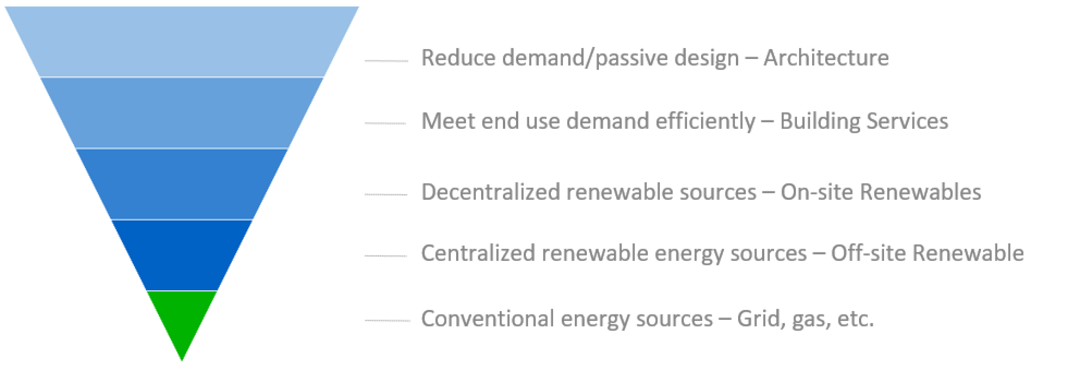
Image source: learn.edgebuildings.com
Energy reduction at the point of consumption is highly significant in conserving resources at the point of energy generation. Specifically, buildings consume a lot of energy in their construction and operation. Measures taken to reduce this energy demand benefit all stakeholders including the environment. Furthermore, in Nigeria, due to electric energy demands outstripping supply, energy efficiency in buildings enables current supply to accommodate more demand (i.e. buildings) while public power generation is being incrementally enhanced.
Energy use in buildings (worldwide):
Records show that buildings consume 36% of worldwide energy use in their construction and operation, even more than industry (32%) and transportation (28%). Buildings also account for the most greenhouse gas emissions at 39%.
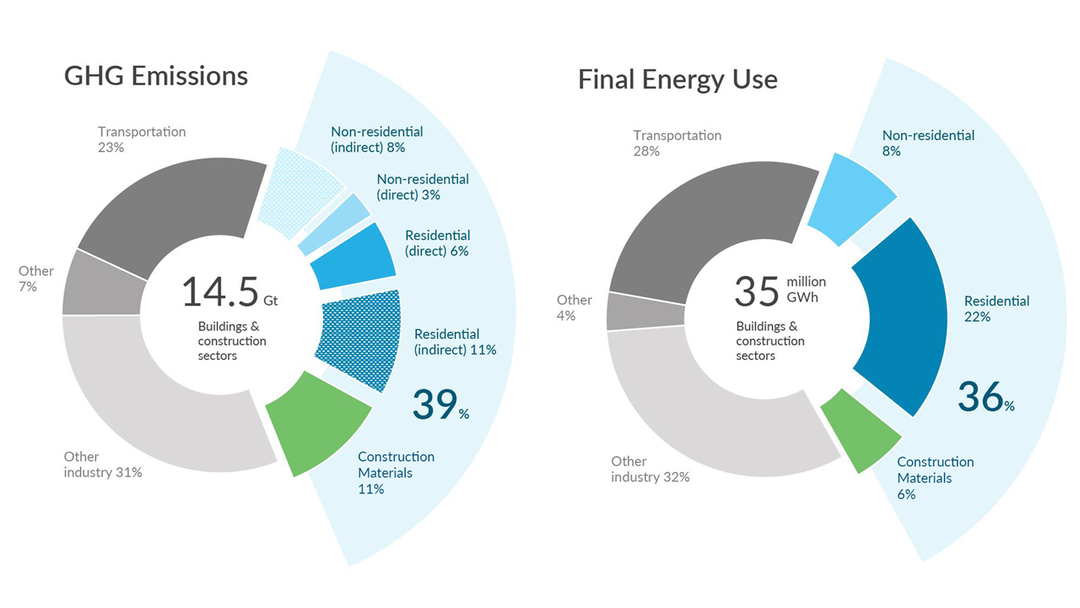
Image source: World energy consumption by sector and type graphs adapted from: edgebuildings.com, IEA and UNEP. 2019. 2019 Global Status Report for Buildings and Construction. Pg. 12; and Levin, K. Dec. 5, 2018. New Global CO2 Emissions Numbers Are In. They're Not Good. WRI.
Energy use in residential buildings (Nigeria):
In Nigeria, according to BEEC, the demand for buildings, ventilation and the cooling of residential buildings accounts for up to 29% of energy use. As more buildings are being added to the housing stock and, bearing in mind the country’s hot climate, the energy efficiency of buildings needs to be thoroughly considered going forward in order to prevent unsustainable energy demands for cooling.
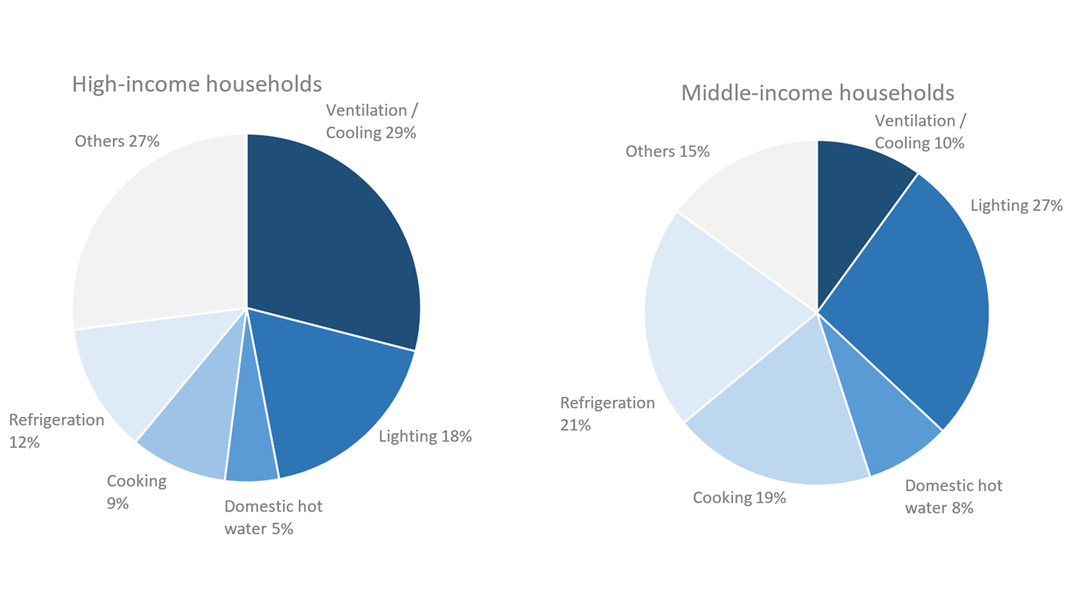
Image source: adapted from National Building Energy Efficiency Code (BEEC)
Designing for success
Achieving energy efficiency in buildings starts with design. At this early stage, it is key to start applying solutions that will deliver a building with reduced energy demand. This involves designing for the specific climatic conditions of the building’s location. For instance, designing to keep out the sun’s heat would reduce the heat load of the building, thereby eliminating or reducing the energy demand for air conditioning that accounts for a major portion of energy use in Nigeria.
There are many opportunities to achieve green solutions with simple adjustments in design and construction. For example, indoor thermal comfort can be significantly improved by incorporating roof and wall insulation. Research shows that a little insulation is far better than no insulation.
Due to an abundance of sunlight in the region, daylighting can be maximized to reduce or eliminate artificial lighting during the day in interior spaces. Furthermore, care should be taken in design to avoid excessive window-to-wall ratios. Building form, orientation and shading design can maximize potentials for passive cooling in commercial buildings, thus minimizing the energy required for cooling. Occupancy sensors and smart controls can switch lighting on and off automatically and regulate HVAC thereby reducing or eliminating energy waste. Efficient building services e.g. low flow plumbing fixtures, energy efficient HVAC systems are readily available on the Nigerian market. Renewable energy e.g. solar photovoltaic system optimized for a passive design can also be very cost effective. Additionally, the constant and gradual increment of electricity tariff enhances the appeal of renewable energy by shortening its return on investment.
Whereas many countries have adopted compulsory green building codes, Nigeria’s code is still in its voluntary compliance phase. This allows for a gradual industry adoption of energy efficiency in building design and construction without major disruption to the established market. The National Building Energy Efficiency Code (BEEC) prescribed measures, when implemented, can save 40% of current energy use in residential buildings and offices.
Benefits of energy efficient buildings
Energy efficiency in building construction and operation leads to several benefits, for both the building owners and occupants. Advantages include reduced energy consumption, which leads to reduced operational costs and an ultimate benefit of reduced life cycle costs. Additionally, sustainable buildings have been proven to deliver a strong return on investment as such buildings reflect an improved property value and are often able to command higher rent due to the appeal of reduced occupant utility. With the implementation of user-friendly technology, energy efficient buildings also offer many occupant comforts such as daylight controls, occupancy sensors, smart meters – providing improved and simplified use. With sustainability as the driving force, energy efficient buildings support the global sustainability agenda, as they consume less natural resources, thus preserving natural resources and the environment. Such buildings also reduce pressure on existing power infrastructure and capacity, thus extending the reach of existing power supply.
Getting energy efficiency to be mainstream in Nigeria
Although accessible now more than ever, energy efficient buildings are yet to become mainstream in Nigeria. The green tag can at times be used indiscriminately in real estate marketing, without the actual benefit it entails, creating doubt in the private market. Perception also plays a role with real estate developers and in the public project domain, with uncorroborated belief that the incremental costs of energy efficient or green buildings are substantial, however, market realities are different.
While some property developers or owners are reluctant to pay more up front for tentative future savings, energy efficient buildings are developed with the aim to lower operational costs, providing long term benefits that far outweigh any short-term gains. A practical example is the inverter split unit air conditioner (AC), which for instance costs 30% more than the non-inverter type. However, it consumes approximately 60% less energy and the return on investment is less than a year.
Furthermore, there are many incentives available in Nigeria to encourage the design and construction of energy efficient buildings, including faster building approvals for energy efficient building designs as well as a duty waiver on energy efficient systems and appliances e.g. solar water heaters, lamps etc. Additionally, Nigeria is developing building energy labels and certificate of use and habitation for National Building Energy Efficiency Code (BEEC) compliance.
Going green with Julius Berger
Julius Berger Nigeria Plc and its design subsidiaries, including PrimeTech Nigeria Limited, are capable to deliver projects to domestic and international green standards such as BEEC, EDGE, LEED and more. Examples include Primetech’s head office in Abuja, and the Nestoil Tower in Lagos, both designed and built according to the “Leadership in Energy and Environmental Design” (LEED) requirements.
Julius Berger Nigeria Plc offers holistic services covering the planning, design, engineering, construction, operation and maintenance of buildings, infrastructure and industry projects in Nigeria. Our history of success together with the shared values that define our culture and way of working gives our clients the confidence to trust us with even their most demanding projects.
As part of the Julius Berger Group, Primetech provides reliable, innovative and efficient solutions for the design and engineering of buildings, industries, civil structures, roads and infrastructure. Primetech´s philosophy reflects a holistic design approach, providing its clients with integral design services coordinated across the disciplines.
